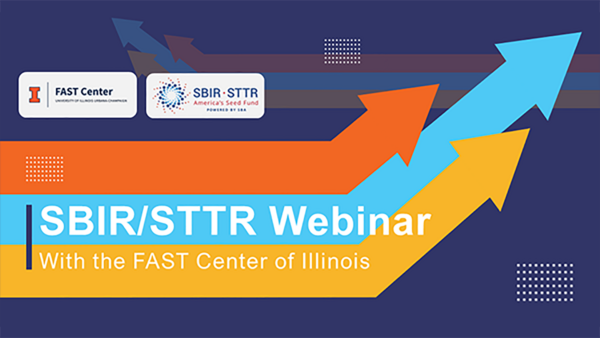
- Sponsor
- Illinois FAST Center
- Registration
- Registration Required
- Contact
- Cheri Soliday
- csoliday@illinois.edu
- Views
- 146
- Originating Calendar
- FAST Center of Illinois Calendar
Join our team of SBIR experts and the FAST (Federal and State Technology) Center of Illinois for an SBIR/STTR webinar event from 1:00-2:00pm on Tuesday, December 19.
Do you think your technology would be of interest to the U.S. Department of Defense (DOD)? Are you somewhat familiar with SBIR/STTR in general (or beyond)? Is it a bit overwhelming trying to find DOD opportunities that align with your technology and commercialization goals? Join us in December to learn from DOD directors that lead their SBIR/STTR Program Office. Their presentation will be followed by a moderated panel of startups that have received DOD SBIR funding. After the presentation, teams will have the opportunity to ask questions (time permitting).
Presenter
Matthew B. Williams is the Acting Director, SBIR/STTR Program Office, Director, OSD Transitions SBIR/STTR Technology (OTST) Program, and the OUSD (R&E) Technology Portfolio Manager for the Office of the Under Secretary of Defense for Research and Engineering’s / Defense SBIR/STTR Program Office. Mr. Williams manages transition activities designed to assist Small Businesses Concerns in getting their technology developed and inserted into Acquisition Program of Records, Systems and Sub-Systems used by our warfighters across the agencies.Prior to his current assignment, Mr. Williams was the NAVAIR SBIR Commercialization Readiness Program (CRP) Manager. The mission of NAVAIR’s CRP program is to provide NAVAIR Program Managers (PMA’s), Competency Managers and Naval Air Warfare Centers (NAWC’s) with transition funding and strategies for state-of-the-art SBIR technologies to be transitioned and/or integrated to NAVAIR Acquisition Program of Records, Research Laboratories and Fleet Readiness Centers. Mr. Williams was NAVAIR’s Phase III Contracting Manager, overseeing contracting support / services to five (5) Program Executive Officers (PEO’s), thirty-three (33) Programs (PMA’s) and five (5) Naval Air Warfare Center (NAWC’s) - managing over 400 contract actions – valued in excess of $400M annually.
Mr. Williams retired after 24 Years of Naval Service as a Flight Engineer. After retirement, he was the KC/C-130J DAPML from 2001-2004 – during initial Aircraft Acquisition.
Panelists
David L. Carroll, CU Aerospace. David Carroll co-founded CU Aerospace in 1998 and has served as its President since 2011. The company’s focus is engineering innovation for new aerospace technology products. He received his Ph.D. in Aerospace Engineering from the University of Illinois in 1992. He was a Visiting Professor at UIUC from 2011-2016. He was inducted as a Fellow of the AIAA in 2011 and a Fellow of SPIE in 2015.Julia Laystrom-Woodard, CU Aerospace. In addition to her role as the Director of Operations, Julie provides specialization in electric propulsion. CU Aerospace develops an innovative range of aerospace technologies, including space propulsion systems, advanced aerospace materials, simulations tools, and plasma technology.
Brian Jurczyk, Starfire Industries. Brian founded Starfire Industries in 2004 after earning dual PhD/MBA degrees in nuclear, plasma, and radiological engineering and technology commercialization from the University of Illinois. Starfire Industries specializes in innovative plasma engineering across a range of markets, including aerospace, defense, nuclear, homeland security, and manufacturing semiconductors.
This is a free, virtual event, but registration is required. The link to the webinar will be emailed to you upon completion of your registration. Recording Notice: By registering for this webinar, you acknowledge and agree that it will be recorded and shared online for public viewing.
SBIR/STTR Office Hours are available to Illinois teams by signing up online at https://go.illinois.edu/FASTOFFICEHOURS. More information on how to access additional Illinois FAST Center resources is online at https://go.illinois.edu/ILFASTCenter.
The Small Business Innovation Research (SBIR) and Small Business Technology Transfer (STTR) programs are highly competitive programs that encourage domestic small businesses to engage in Federal Research/Research and Development (R/R&D) with the potential for commercialization. Through a competitive awards-based program, SBIR and STTR enable small businesses to explore their technological potential and provide the incentive to profit from its commercialization. By including qualified small businesses in the nation's R&D arena, high-tech innovation is stimulated, and the United States gains entrepreneurial spirit as it meets its specific research and development needs.